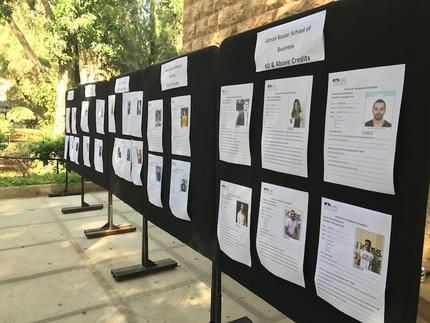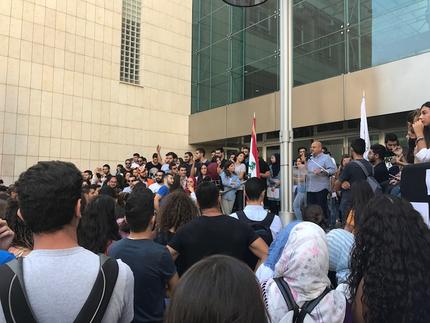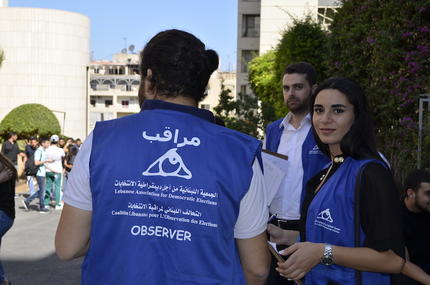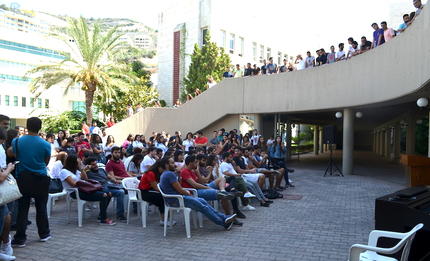LAU guides students through peaceful and democratic elections
A program of awareness and training in the run-up to the elections ensures that principles of democracy are observed.

In addition to the public forums, nominees were introduced to the student body through standardized posters detailing the priorities each candidate intended to address as a member of the LAU Student Council.

“The public forum attracted a large number of students,” said Dean of Students on Beirut Campus Raed Mohsen, “and has become a tradition during election week that candidates and voters looked forward to,” giving nominees the opportunity to present their programs and rally support.

The Lebanese Association for Democratic Elections (LADE) ran workshops on campus for all Student Council nominees and were present on the day of the elections as monitors.

Hundreds of students spread out by the fountain at the Byblos campus to listen to the speeches of student council nominees.
Elections are a passionate affair the world over and a time when tensions often rise as marked differences in the ideologies and proposed policies of nominees ignite verbal and sometimes physical clashes.
Lebanon is no different, but LAU has over recent years been implementing a program of awareness and training to ensure that students understand the principles of democracy and use their right to vote and participate actively in student life.
“Elections are the most important stone in democracy,” said Ayman Dandash during a workshop he conducted ahead of this year’s Student Council Elections. Participation in the seminar was compulsory for all nominees looking to be elected as Dandash, a trainer with The Lebanese Association for Democratic Elections (LADE), was brought in to introduce them to the purpose and process of democratic elections.
Dandash highlighted the nominees’ responsibility to both educate themselves and others about the electoral process. The workshop, held at both Beirut and Byblos campuses, concentrated on the development of factors that would help differentiate candidates. “Some students are affiliated to political parties, but we should really focus on policies and on our home at LAU and its needs,” one student said.
Dandash agreed, reminding students that a university is a microcosm of the wider community, one that they would soon be engaged in fully. “If I now, as a 20-year-old, can make a change in these three acres, then I can do the same for my country,” added another student who clearly has long-term political ambitions. He was among the nominees who, in the days leading up to the elections last Friday, gave a short speech at a public forum held outside the library at the Beirut campus and by the fountain at the Byblos campus.
“The public forum attracted a large number of students,” said Dean of Students on Beirut campus Raed Mohsen, “and has become a tradition during election week that candidates and voters looked forward to,” giving nominees the opportunity to present their programs and rally support. It “also allows them to practice their persuasive speaking skills in a noisy environment that is totally different from the quiet classroom atmosphere.”
The ruckus notwithstanding, the general mood of these gatherings was one of cooperation, marked by a common wish to make a difference. “I was proud to see the students committed to change and to helping their peers,” said Makram Ouaiss, dean of students on Byblos campus, where speeches were complemented by booths where students could meet the candidates, musical performances, sweets stands, and quotes about democracy posted across campus. “The energy was high and the policies and ideas presented by some candidates unique,” added the dean.
Students then took to their computers, tablets and phones on Friday, October 6, to vote for their preferred candidate. The system of online voting, set up in 2016 to ensure fair elections free from intimidation and fraud, registered the participation of 83 percent of eligible voters.
Within minutes, the results were in and communication arts major Kourken Papazian found himself a member of the Beirut student council. He had presented a very thorough action plan during his forum speech, which included proposals for a bicycle rental system for students and an online portal through which they could address problems anonymously. “I congratulate all those who participated in the democratic election process and will do my very best to pursue the issues raised in my campaign plan,” said Papazian upon hearing that he had won a seat on the student council.
“Students have a lot of say in how things are run and developed at LAU,” explains Beirut Campus Activities Associate Manager Riman Jurdak. “Their effectiveness in making that change lies with them and their commitment to the role they have been elected into.”
For more information check out the elections website.
Learn more about the election process and the students elected into the Student Council at the Student Life website
More
Latest Stories
- LAU Athletes Bring Home Trophies from Athens and Belgrade
- From Ruins to Resources: Reimagining Lebanon’s Post-Destruction Urban Spaces
- Medical Graduates Showcase their Research Leadership
- To Dance Toward Tomorrow
- Six LAU Faculty Listed Among the World’s Top 0.05 Percent by ScholarGPS
- Lebanon’s Brightest Compete for LAU Engineering Scholarships
- This Summer: Robotics and Artificial Intelligence Summer School for Middle Schoolers
- Into the Psychology of Justice

